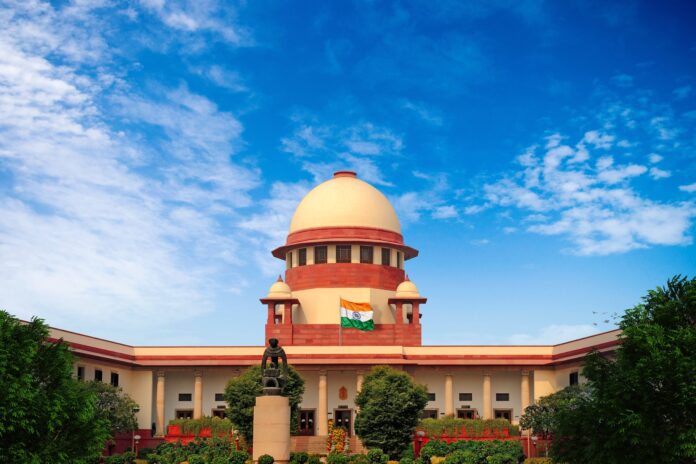After the Indian Supreme Court ruled against marriage equality in October, it declined to include LGBTQ people in regulations against sexual harassment.
Justices Bangalore Venkataramiah Nagarathna and Ujjal Bhuyan said the existing 2013 law against sexual harassment in the workplace cannot be made gender-neutral in order to include the LGBTQ community. The judges observed the focus will be lost from the principal goal of preventing sexual harassment of women in the workplace if such amendments to the Sexual Harassment of Women at Workplace (Prevention, Prohibition and Redressal) Act, 2013 are made.
“If a person other than an ‘aggrieved woman’ is subjected to sexual harassment, the answer does not lie by amending the existing regulations,” the judges who heard the petition said. “It would be inappropriate to direct the amendments to be made to the 2013 regulations as otherwise the whole purpose and object of the said regulations would be diluted and denuded of its effect.”
Vibha Datta Makhija, a senior activist, appeared before the bench for the plaintiff and said the regulations should provide gender-neutral protections and include LGBTQ people. She also said the regulations are inadequate, given LGBTQ people and other groups are constitutionally recognized. The Supreme Court, however, relied upon previous rulings that stated a constitutional court would not issue a “writ of mandamus” to a legislature or to a rule-making body to enact a law on a particular subject.
The Supreme Court mentioned regulation of the 2013 law was made in view of Clause 3 of Article 15 of the Indian constitution. Clause 3 of Article 15 focuses on “women” and “children.” The clause states nothing shall prevent the State from making any special provision for women and children. Article 15 of the Indian Constitution talks about the prohibition of discrimination on grounds of religion, race, caste, sex, or place of birth.
The Supreme Court in 2014 issued a historic ruling in the case of the National Legal Services Authority vs. Union of India, which recognized transgender people as a third gender. There is, however, no law to protect trans people from sexual harassment in the workplace.
A 2015 report notes 44.7 percent of trans people faced 2,811 incidents of violence in India.
The Swasti Health Resource Center in research it conducted in different parts of India found four in 10 trans people experience some kind of sexual abuse and associated trauma before they turn 18. The National Human Rights Commission of India in another study found roughly 52 percent of trans people faced harassment by their school classmates and 15 percent of trans people suffered mistreatment at the hands of their teachers.
Current Indian laws do not define a sexual offense committed by anyone, irrespective of severity, that does not fall under “rape,” and may be filed under Section 377 of the country’s penal code that deals with “unnatural sex.”
The World Bank Group in 2014 published a report titled, “The Economic Cost of Homophobia and the Exclusion of LGBTQ People: A Case Study of India.” The report noted homophobia and exclusion of LGBTQ people from the workplace causes a 1-1.7 percent loss of GDP. It also indicated 56 percent of LGBTQ people reported discrimination in white-collar jobs in the country.
Forty percent of respondents who participated in the Indian LGBT Workplace Climate Survey 2016 said they suffered harassment and had experienced homophobic comments. The National Human Rights Commission of India reported 92 percent of trans persons are denied the right to participate in any form of economic activity. They were denied jobs, and 18 percent of respondents suffered physical abuse.
“The statements made by the Supreme Court judges, it is quite clear that just as marriage equality, they are saying they do not want to dilute any existing laws,” said Harish Iyer, a prominent equal rights activist in India. “Judges are not opposed to the idea that sexual harassment of LGBTQ people needs to be prevented.”
Iyer told the Washington Blade that corporations need to step up their processes and practices to include LGBTQ people. Iyer said they should have an internal inquiry board to prevent any sexual harassment of LGBTQ workers.
“Corporates can set up the same POSH committee for internal investigation on matters relating to men and LGBTQI people,” said Iyer. “This does not impede what corporates can do to protect the lives of LGBTQ workers.”
Shoaib Khan, the first trans woman from the Indian state of Kashmir to succeed in India’s corporate world, told the Blade the ruling is quite unfortunate.
“It is not about the particular gender. The harassment is not subjected to a particular gender, it is subjected towards a person,” said Khan. “I feel like the Indian Constitution should overthink and overrule this judgment.”
“Multiple companies are following the code of conduct policies in terms of protecting sexual harassment at the workplace irrespective of gender, but those are all multinational companies,” added Khan. “Indian companies need to consider the fact that we as minorities have suffered a lot, so excluding us from protecting our rights at the workplace is something insane.”
Story courtesy of the Washington Blade via the National LGBTQ Media Association. The National LGBTQ Media Association represents 13 legacy publications in major markets across the country with a collective readership of more than 400K in print and more than 1 million + online. Learn more here: https://nationallgbtmediaassociation.com/.
